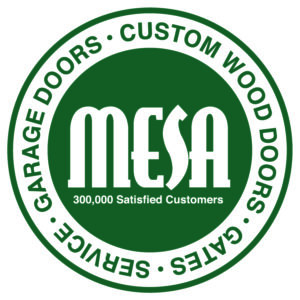Guide to Choosing a Driveway Gate
A driveway gate helps control access to your property. But it’s more than just a security feature. It can have personality and add curb appeal. There are many considerations when choosing a gate for your driveway. In this guide, we’ll look at the types of gates, design elements, accessories, and other things to consider when planning to add or update your driveway gate.
Choose a Material
At Mesa Garage Doors, we’re known in Southern California for our custom wood gates. We use mahogany, redwood, and the finest materials to ensure every driveway gate we install meets your functional and aesthetic needs. Wood provides flexibility for customization and can accommodate various colors and textures, but other materials can be used, such as:
- Steel: Powder-coated steel is easy to manufacture and customize and is preferred for its durability and security.
- Iron: Iron has the strength and durability of steel and has aesthetic benefits; it’s also long-lasting if well-maintained.
- Aluminum: Being lightweight suits aluminum for larger gates; it’s also rust-resistant and affordable.
- Glass: Glass can add a contemporary look to a driveway gate (within an elegant steel frame), be finished in almost any color, and be decorated in sophisticated ways.
Decide on a Theme
The gate should blend in with your home’s exterior. Wood or steel work with a modern-style home, while a picket fence and gate go well with Craftsman-style homes. Other gates are suited for European, gothic, colonial, and other styles. Many gates have an open picket design, but if you prefer privacy, you can choose a more solid material, which also protects against people and animals from outside.
Select a Size and Shape
The required width is straightforward to measure. But the height of the gate is often your call. A standard height is fine if the gate isn’t meant to stand out. If you prefer large and grandiose, go with a taller gate. But remember the taller and larger the gate, the more material you’ll need, and generally the higher the cost.
Driveway gates can also incorporate almost any kind of shape. Most residential gates have vertical pickets surrounded by a solid frame. Simple rectangular gates have a flat top. Arch-top gates are also common. They can have a smooth top or the pickets can extend above the top, creating points that extend above the arch.
Operational Considerations
Driveway gates can be manual or electronic. Many people don’t mind walking to the gate and opening it by hand. If you have a long driveway and often have visitors, that might not be the case. An electronic gate offers the benefit of remote control operation. Other features and options include:
- Direction of Movement: Whether you want the gate to open to the left or right is a matter of style and available space. If space is at a premium, a sliding gate is best.
- Remote Access: For your convenience, some gates can be set up with remote entry, so you can use your phone to open, close, and lock/unlock it.
- Gate Alarms: An alarm can alert you if someone tries to tamper with the gate, climb over it, or break into your home.
Accessories
Numerous accessories are available for driveway gates. The most frequently used accessories include:
- Sensors: Motion sensors can activate lights and video, while vehicle sensors trigger the gate automatically when a vehicle enters and exits. Photo beams can add safety for occupants and visitors.
- Programmable Timers: Using a timer, the gate can be shut and locked automatically or opened during specific time frames.
- Access Controls: A basic pin pad allows one to enter a passcode to open the gate. Card readers let anyone with a card quickly gain entrance. With a wireless intercom, you can communicate with visitors without going outside.
- Maglocks: Able to withstand great force, magnetic or solenoid locks engage electronically, so provide more security than other locking systems.
- Solar Panels: Standard gates operate via electricity, but some gates can be wired to solar panels so you can rely on clean energy.
Professional Installation
Installing a driveway gate yourself isn’t a good idea. Hiring a professional ensures installation is done properly and all requirements are met. The job requires a variety of skills, including metalworking, hardware installation, and software programming. Electrical, masonry, and landscaping work may also be required. A professional will make sure the gate is set up properly and runs smoothly and safely.
The installation process is generally as follows:
- A design consultation with your contractor
- A review of design ideas, materials, and accessories
- Receive an estimate for the installation
- Sign the contractor’s agreement and authorize them to begin the project
- Grading, leveling, wiring, and other types of preparation
- Installation of your driveway gate
- Testing of locks, safety controls, and other functional elements
Contact Mesa Garage Doors
We install high-quality driveway and pedestrian wood gates, all fabricated in our Southern California shop. Our team works with your ideas and can provide an array of custom options. To request a consultation and estimate, call (714) 844-5741 today.A driveway gate helps control access to your property. But it’s more than just a security feature. It can have personality and add curb appeal. There are many considerations when choosing a gate for your driveway. In this guide, we’ll look at the types of gates, design elements, accessories, and other things to consider when planning to add or update your driveway gate.




